It's a few days later than when it aired, but hey, there was a lot to watch with "Bandersnatch", and watching (and reviewing) it involved some unique challenges.
I'm going to assume that someone, somewhere, lived in a cave and hasn't heard about the big "spoiler" of how the episode is set up. So…
If you want to read the big spoiler of the episode gimmick, go to paragraph 3.
If you want to read the plot of the episode, go to paragraph 99b.
If you want to read a review of the gimmick, go to paragraph 1252.
If you want to read a review of the episode, go to paragraph 20514.
Paragraph 3
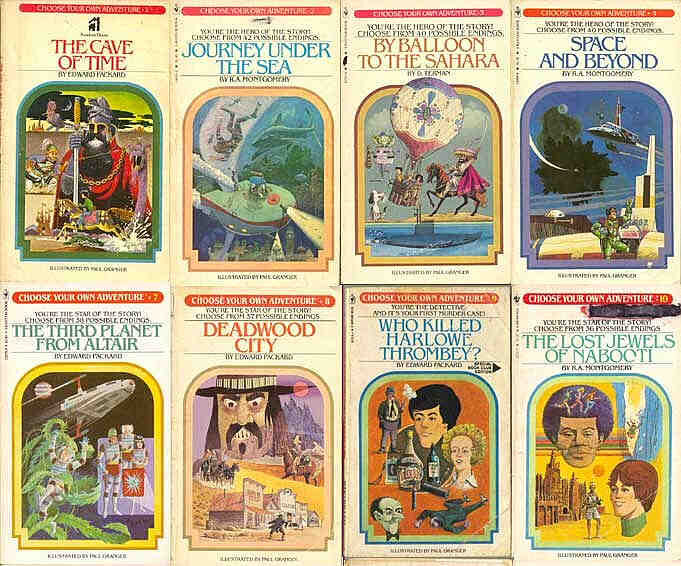
"Bandersnatch" is a 2018-tech version of the gamebook genre, which dates back to roughly 1930. They've come and gone over the years, and appeared in a variety of milieus such as role-playing and computer games.
Basically, the participants choose from between two or more options. In the book format, each choice directs a user to a paragraph or chapter in the book. You go to the paragraph, read the paragraph, and typically make another choice which leads you to other paragraph, and other choices, and so on, and so on. Eventually you come to one of several different adventures. If you reread the book and make different choices, you probably end up at a different ending.
"Bandersnatch" emulates this on the Netflix platform by providing the viewer with ways to make choices along the way. Choices may include which cereal the main character eats, or which record the character buys, or which character leaps to their death.
Paragraph 99b
"Bandersnatch" is set in 1984, and young game programmer Stefan Butler (Fionn Whitehead) is creating a choose-your-own-adventure computer game based on the novel "Bandersnatch" by Jerome Davies (Jeff Minter). The novel is a choose-your-own-adventure book, and we never find out what the plot is. There are hints dropped along the way, involving the government and a strange religion and a demon named Pax. But the plot of the novel doesn't matter.
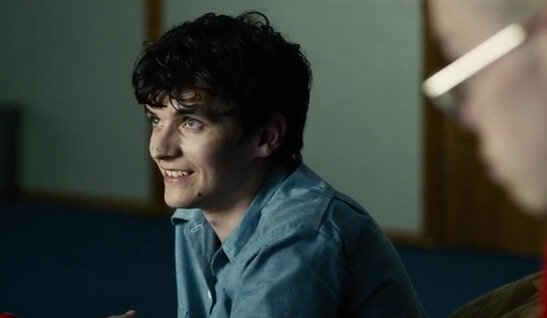
Stefan takes his game to a computer company, Tuckersoft, and they agree to distribute the game if Stefan has it ready by Christmas. He goes to work and discovers Davies became obsessed with the multiversal theory, or quantum-string theory, or whatever it's called. The theory boils down to the fact there are an infinite number of realities created by each person making an infinite number of binary choices. You turn left, and one thing happens. You turn right, and something different happens. Then after you turn left, you turn left or right again, and so on and so on, ad infinitum. All of those realities exist, which means there are an infinite number of "you"s, which means what you do in one reality doesn't matter because it didn't happen in infinity minus one other realities.
This led Davies to madness and he ended up decapitating his wife. We never do find out what happened to Davies. Stefan goes down the same path, and the viewer chooses different choices for Stefan and all of them are filmed. Writer and series creator Charles Brooker doesn't write and film an infinite number of choices: they boil down to several endings. Stefan makes the game as part of a team and it bombs; Stefan kills his father Peter; Stefan goes back in time and alters history so he dies with his mother in the train accident that took her life; Stefan kills himself to "prove" what he does in one reality doesn't matter; and Stefan discovers he's been secretly monitored by the government and Peter has been in charge of the monitoring.
The viewer choices lead to different endings. For instance, if you choose "TOY" as a password at one point, Stefan has the time-travel ending. If you choose "PAC", you get the secret-monitoring ending. As a result of all this, there is no one specific "ending" to the episode. None of the outcomes are particularly cheerful, but then again it's Black Mirror so what did you expect?
Paragraph 1252
The gimmick is pretty much the episode. "Bandersnatch" is a mélange of stories all interwoven with each other, that change depending on how often you watch and what choices you make. Like most Black Mirror episodes, "Bandersnatch" lives up to the series title. You see your choices darkly reflected in what happens to the character. And as noted, all of the endings are pretty depressing. Stefan doesn't get his game made at all well; Stefan discovers his life has been a lie; Stefan kills his father by beating his skull in and possibly sawing him apart; Stefan dies in a train accident as a young child. The "best" ending is arguably that Stefan simply doesn't make a good game but stays sane.
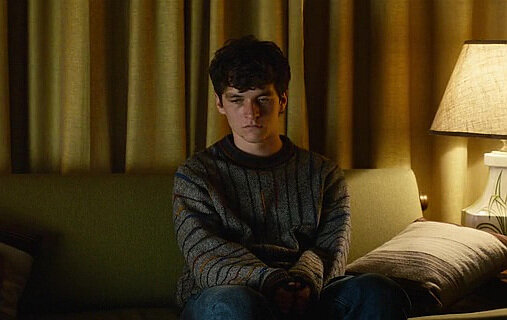
There's a framing device of sorts, where Stefan is trying to get a better rating for his game from a TV reviewer. For instance, after Stefan makes the game as part of the Tuckersoft team and gets a bad rating. So he decides to do it again, decides to make it himself, and goes nuts. So you can "play" the episode to try to get a five-out-of-five. That will end up with Stefan in prison after killing Peter, but hey, you win some, you lose some.
Filming all the endings and developing the plot points so that the viewers can make the choices to get to them is all very competently accomplished. It makes for difficult viewing and reviewing if you're trying to grasp the whole. Already Twitter threads have sprung up created by people trying to chart all of the endings and how to get to them.
As I noted earlier (go to beginning of Paragraph 1252), the gimmick pretty much consumes the episode. You're so busy keeping track of the choices and endings it's hard to focus on the plot and characterization. Which brings us to…
Paragraph 20514
The episode itself isn't that special, and in a sense it's more of a Charlie Brooker episode (if there is such a thing) than a Black Mirror episode. There's none of the high-tech/futuristic horror we see in most of the other episodes. "Bandersnatch" is probably closest to the very first episode of Black Mirror, "The National Anthem". It doesn't look at how technology affects society and one case where it goes wonky, like many of the BM episodes. But unlike "National Anthem", "Bandersnatch" doesn't even look at something "modern". Gamebooks have gone on in one format or another over the decades since 1984, but they never really caught on and didn't have a huge impact on society. At best, they've mutated into other forms of entertainment: parallel universes on TV shows and movies and to a certain degree, binary-choices in first-person shooters. But even then, gamebooks and binary-choices aren't as significant as the voyeuristic exploration of society we get in "National Anthem".
The descent-into-madness motif is similar to that in the episode "Crocodile", where a woman is forced to kill and kill again to protect herself after she accidentally kills someone. Or "Nosedive", where a woman ends up in a spiral of near-madness as she tries to keep her social "rating" up
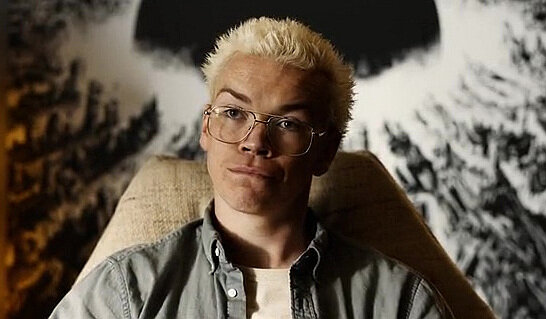
Since we never find out much about Davies or care what happened to him, "Bandersnatch" is just watching one person, Stefan, go into a spiral of madness brought on by programming Bandersnatch the computer game. Fionn Whitestone is decent enough, as is Will Poulter as the convenient mentor-type character, Colin Ritman, who expositions about binary-choice realities and time travel and government conspiracies to foreshadow the various endings.
But we never find out much about Stefan. That's a disadvantage of the binary-choice format: sometimes he's sympathetic, sometimes he's not. At the end of the day he's apparently "happiest" when he gets what he wants: to die with his mother at an early age rather than live a life of anxiety and mental disorder. But we never learn enough about him to grasp if that was really what he wanted. Stefan ends up with as much personality as many of the "characters" in the gamebooks and related computer games that just go from Paragraph 1 to P23 to P37 to End Paragraph 152. That's to say, none.
You do get sucked into Stefan's travails and sympathize with him to some degree. But that's primarily because of the gimmick: as the viewer, you're the one who chooses the options that drag him deeper and deeper into madness. Your mileage may vary, but the likelier you are to select a particular outcome, the more likely the outcome will be bloody and depressing. Or you'll replay the episode to try to get to the outcome. Multiple times, which means "you" are essentially torturing Stefan over and over and over again. For instance, you can choose the "Stefan screws up the game by working with a team" ending. But then the episode is over pretty quickly with a minimum of fanfare. Wouldn't you rather choose the ending that goes longer and where Stefan saws off his father's head, or fights his therapist to the death?
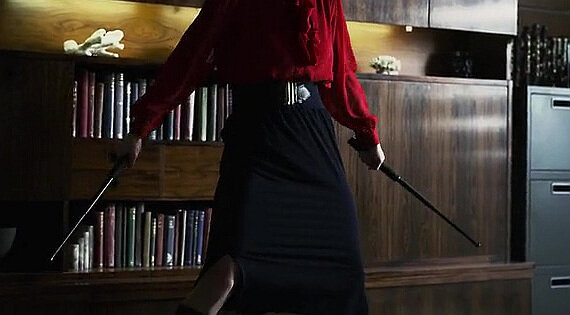
The rest of the characters are pretty much ciphers. Particularly Craig Parkinson as Stefan's father Peter. Sometimes he's good, sometimes he's bad, sometimes he's an innocent schmuck that ends up with his head bashed in. Ditto for Stefan's therapist Dr. Haynes (Alice Lowe). There's a cute bit where she turns into an action-combat antagonist when she points out Stefan's life is pretty ordinary and who would want to watch it, and whips out a pair of extendable batons. Which leads to a mini-ending where Stefan discovers he's an actor in the filming of his life for Netflix which goes nowhere. But otherwise Haynes alternates between sympathetic, and tear-stricken (after Stefan dies in her office when his younger self dies in the past), and conspiratorial in a brief bit when Stefan discovers she's part of the government monitoring program.
The rest of the characters blend even further into the background. Asim Chaudhry as Mohan, the owner of Tuckersoft, is the only one who seems to have a bit of fun playing a "Got to have it the stores by Christmas" boss while managing to give Mohan a little bit of personality. Everyone else is there to service the various endings. For instance, Laura Evelyn plays Colin's daughter Pearl, who when she grows up, tries to write her own version of "Bandersnatch" and starts heading down the same path as Stefan. But we never find out anything about her: she's just there to provide another ending.
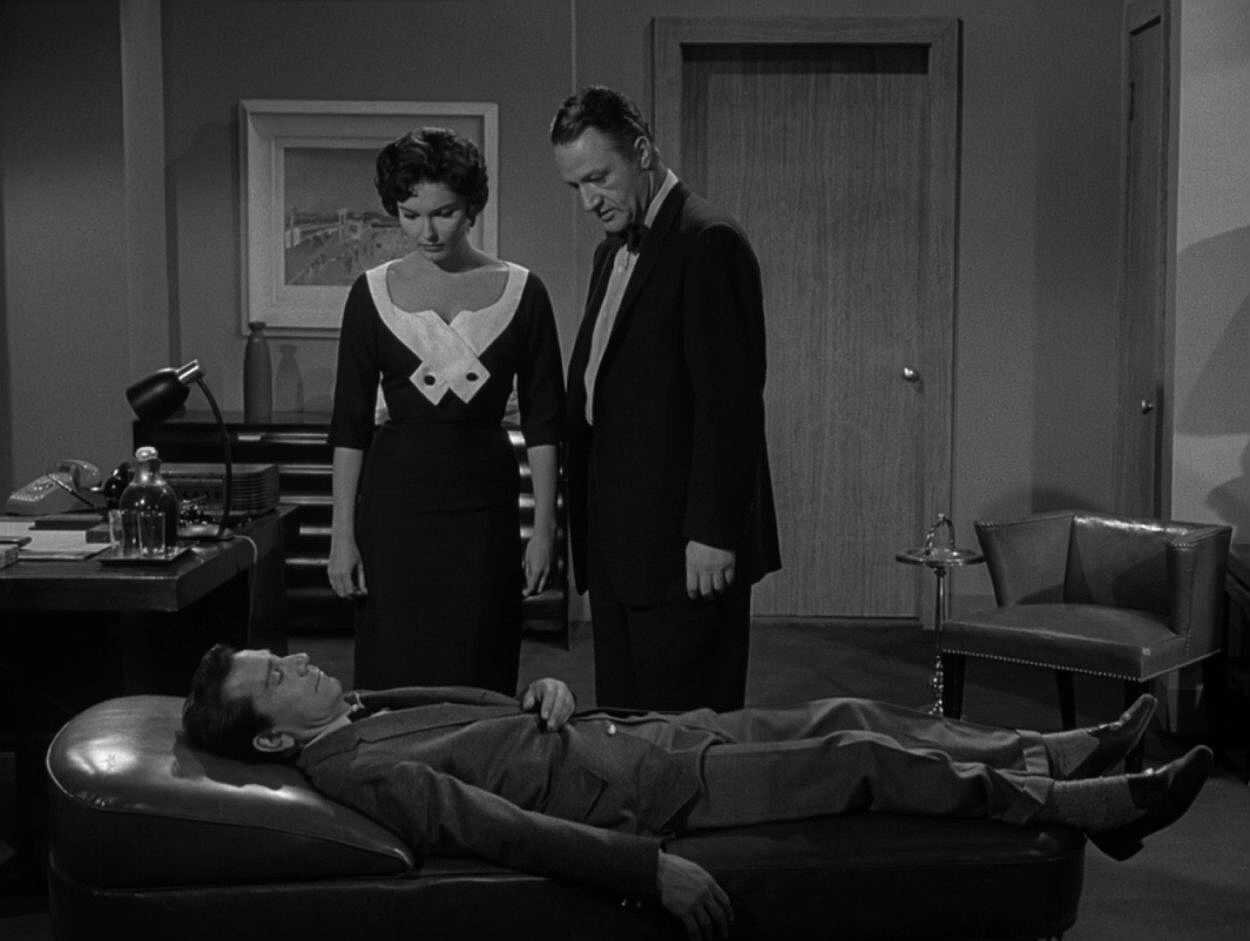
Black Mirror has been described as a modern-day version of The Twilight Zone. And it ends up with elements of three episodes: "The Trouble With Templeton" (a man discovers that his life is a stage set and he's an actor), "Perchance to Dream" (a man walks into a therapist's office and eventually dies quietly), and "Shadow Play" with the main character reliving different versions of "reality".
Overall, "Bandersnatch" is entertaining. But the gamebook gimmick is like a magician's misdirection: you're so busy watching the gimmick and being sucked into it that you aren't paying much attention to the episode itself. But then again, maybe that's the point and it's all Charlie Brooker screwing with the audience. Because that's the guy Brooker seems to be, and we love him for it.
But that's just my opinion, I could be wrong. What do you think?
Written by Gislef on Jan 2, 2019




I enjoyed watching the episode and thought it was fun they broke the viewer/actor barrier. "You are being controlled by someone from the future" thing! Cool! The whole thing was not on par with previous episodes of Black Mirror, but as an experiment it worked well.
And, hi Gislef! Nice to see posts here from a familiar face!
Very inovating episode. Recomend. Just watched 4 different finals
Very nice review of an outstanding episode experiment.
That's part of my point, though, and I suspect Brooker's. Why do we enjoy the episode? Because we get to put the protagonist through various types of hell? Because we hope to find a happy ending for him? Or do we just enjoy the craftsmanship of putting the episode together?
To me, "Bandersnatch" is an extension of Brooker's philosophy in "White Bear". There the viewers in the show contribute to punishing the guilty. In "Bandersnatch", Stefan isn't guilty and we the viewer "make" him a killer in most of the scenarios. In "White Bear" we and the viewers in the show didn't turn Victoria into a murderer's accomplice. In "Bandesnatch", we typically make Stefan a killer.
Heady stuff, eh? :)
Nice review... Go with flow and enjoy the episode... Return as wish and get some other path and again enjoy the episode... Entertainment till Season 5 premieres...